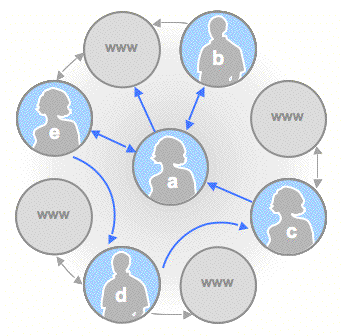The Google Social Graph API is a new programming API that allows developers to expose social relationships embedded in web sites. What does this mean for regular folks like you and me? Read on.
Do you ever feel like your personal information is spread across the web in a whole bunch of separate places? An account here, a profile there? A friends list here and a friends list there? All your information, but in all different places all incomplete at the same time?

The Social Graph API helps solve this “silos of information” problem by allowing people to write software that understands who your friends are. It does this by reading your web site or blog and making connections between the social profiles you have across the web.
For example, imagine you have a blog, which is your home on the web. You also have an Amazon profile, a Twitter profile, and a Facebook profile. So you have four profiles spread across the web, seemingly unconnected. Amazon has no idea who your friends on Facebook or Twitter are, and vice-versa, and this is a good thing from a privacy standpoint. These sites shouldn’t be able to find out everything about you with you giving them permission.
But what if you wanted these sites to know a bit about each other? What if you want to combine your Amazon book history with your friends lists at Facebook so that you can see what your friends are reading and let Amazon give you recommendations based on your similarity with them? Or, perhaps you just joined Twitter and want to know which of your Facebook friends are already there so you don’t have to go hunting for them? (see video) Here we see real-world examples of how cross-pollinating your personal information between these sites can not only be efficient, but desirable…
Continue Reading: Why I’m excited about the Google Social Graph API
